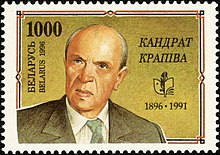Kandrat Krapiva
- View a machine-translated version of the Belarusian article.
- Machine translation, like DeepL or Google Translate, is a useful starting point for translations, but translators must revise errors as necessary and confirm that the translation is accurate, rather than simply copy-pasting machine-translated text into the English Wikipedia.
- Do not translate text that appears unreliable or low-quality. If possible, verify the text with references provided in the foreign-language article.
- You must provide copyright attribution in the edit summary accompanying your translation by providing an interlanguage link to the source of your translation. A model attribution edit summary is
Content in this edit is translated from the existing Belarusian Wikipedia article at [[:be:Кандрат Крапіва]]; see its history for attribution. - You may also add the template
{{Translated|be|Кандрат Крапіва}}to the talk page. - For more guidance, see Wikipedia:Translation.
Kandrat Krapiva | |
|---|---|
 Krapiva on a 1996 stamp of Belarus | |
| Born | 5 March 1896 Village Nizok, Minsky Uyezd, Minsk Governorate, Russian Empire |
| Died | 7 January 1991 (aged 94) Minsk, Byelorussian SSR, Soviet Union |
| Occupation(s) | Writer, playwright, poet, translator, critic |
Kandrat Krapiva (Belarusian: Кандра́т Крапіва́, 5 March 1896 – 7 January 1991) was a Soviet and Belarusian writer, playwright, social activist, and literary critic. He was the winner of two Stalin Prizes in 1941 and 1951 and winner of the USSR State Prize in 1971. From 1950 he was a member of the Academy of Sciences of the Belorussian SSR. He was a writer for the magazine, "Połymia".[1]
Krapiva served in the Tsarist army from 1915, the Red Army from 1920 to 1923, and was involved in the Soviet annexation of Western Belarus in 1939, the Winter War (1939-1940) and the German-Soviet War (1941–45).[2] He began his literary career in 1922, writing fables, poems, narrative poems, and short stories. Among his notable short stories are The Nettle (1925), Fables (1927), Neighbors (1928), and Live Phenomena (1930). He published the novel The Miadzviedzičy in 1932. He was also a notable playwright, writing plays such as The Partisans (1937), a heroic drama, and He Who Laughs Last (1939), a comedy which earned him the Stalin Prize in 1941. Post-war plays include With the People (1948) and People and Devils (1958).[2]
References

- ^ "Event devoted to the 90th anniversary of the magazine Polymya". National Library of Belarus. Archived from the original on 4 March 2016. Retrieved 8 January 2013.
- ^ a b "Kondrat Krapiva". The Great Soviet Encyclopedia. 1979. Retrieved 8 January 2013.
- v
- t
- e












